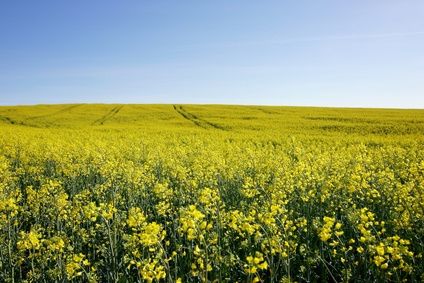
I read a compelling blog post last week from Bruce Bradley about the dangers of simple labeling. Items that might seem innocent and "natural" actually tell a much different story if you look beyond the picture on the label.
Questioning Labels
One of the misleading ingredients he wrote about in Land O'Lakes butter was canola oil. I've heard nutritionists, Food Network stars, and magazines all claim that the oil is heart-healthy because it's low in saturated fat, but what Bradley explains is that "the majority of canola is derived from genetically-modified rapeseed" and that canola oil is "very highly processed and undergoes intensive manufacturing steps like being refined with hexane and then bleached." None of that sounds natural to me, and until I looked it up, I didn't know what hexane was.
(In case you're curious, Hexane is a hydrocarbon with the chemical formula C6H14; that is, an alkane with six carbon atoms. In industry, hexanes are used in the formulation of glues for shoes, leather products, and roofing. They are also used to extract cooking oils from seeds, for cleansing and degreasing a variety of items, and in textile manufacturing. According to a report by the Cornucopia Institute, hexane is used to extract oil from grains as well as protein from soy, to such an extent that in 2007, grain processors were responsible for more than two-thirds of hexane emissions in the United States.) (Thank you, Wikipedia.)
When he emailed Land O'Lakes to find out if it used GMO canola oil, they dodged the question, but eventually admitted that its products are not GMO free. (Read more about the email exchange on Bradley's blog.)
History of Canola Oil
 Canola was developed through conventional plant breeding from rapeseed, an oilseed plant that has been used as a fuel, specifically for lamps, in Asia and Europe. Its demand grew in World War II for use on naval steam engines, and when sources were blocked, Canada began to expand its rapeseed production. When demand declined after the war, extracts were first used in consumer food products in 1956.
Canola was developed through conventional plant breeding from rapeseed, an oilseed plant that has been used as a fuel, specifically for lamps, in Asia and Europe. Its demand grew in World War II for use on naval steam engines, and when sources were blocked, Canada began to expand its rapeseed production. When demand declined after the war, extracts were first used in consumer food products in 1956.
Once considered a specialty crop in Canada, its now become an American cash crop, producing 7 and 10 million tonnes of canola seed per year. Almost all commercial grade canola oil is then refined using hexane.
Where do we go from here?
I'm diligent about limiting or completely eliminating processed food, where most genetically modified organisms can be found, but this article made me question even the "simple things," like canola oil and butter.
I did some research, and thankfully, there are several brands of non-GMO canola oil on the market, including one from Whole Harvest. The next time I need to buy a bottle, I'm planning to read the label much more carefully.
Which products have you stopped buying because of what you learned from the label?